
The Stephen Wolfram Podcast
Wolfram Research
Stephen Wolfram is the creator of Mathematica, Wolfram|Alpha and the Wolfram Language; the author of A New Kind of Science; and the founder and CEO of Wolfram Research. Over the course of nearly four decades, he has been a pioneer in the development and application of computational thinking—and has been responsible for many discoveries, inventions and innovations in science, technology and business. On his podcast, Stephen discusses topics ranging from the history of science to the future of civilization and ethics of AI.
- 1 hour 24 minutesBusiness, Innovation and Managing Life (January 29, 2025)
Stephen Wolfram answers general questions from his viewers about science and technology as part of an unscripted livestream series, also available on YouTube here: https://wolfr.am/youtube-sw-qa
Questions include: How do we know how far stars, galaxies, etc. are in space? - Can you tell about the science of gem cutting, brilliance, internal refraction, etc.? - Does that mean that objects with higher refractive indexes heat up more? - Are there any materials that slow light down enough so that we can actually see it traveling without technology helping out? - How would you describe science? And how are you staying a scientist? - Can you talk about scientific paradigms? - Interesting parallel to current research in LLMs that have so many variables and so much variability that reproducibility is extremely hard—even if it is "just" computers. - Do you think science has a problem with trying to tell nature how to behave rather than reporting on what nature is telling us? - What if you start the prompt with a script for the tech demo and ask the LLM to not go off script? - I've often been amazed at how LLMs sometimes reproduce realistic human behavior. We have seen them sometimes "lie" or try to "cover" a mistake. - What's your intuition now for what makes the best prompter? - Do you have any suggestions on coming up with ways to test hypotheses, especially ones that are more theoretical and difficult to test in the real world? How do you know when you have a good test? - How are diamonds made? - How can fermions adopt a condensate configuration, or can they?5 February 2025, 1:00 pm - 1 hour 29 minutesScience & Technology Q&A for Kids (and others) [January 24, 2025]
Stephen Wolfram answers general questions from his viewers about science and technology as part of an unscripted livestream series, also available on YouTube here: https://wolfr.am/youtube-sw-qa
Questions include: How do we know how far stars, galaxies, etc. are in space? - Can you tell about the science of gem cutting, brilliance, internal refraction, etc.? - Does that mean that objects with higher refractive indexes heat up more? - Are there any materials that slow light down enough so that we can actually see it traveling without technology helping out? - How would you describe science? And how are you staying a scientist? - Can you talk about scientific paradigms? - Interesting parallel to current research in LLMs that have so many variables and so much variability that reproducibility is extremely hard—even if it is "just" computers. - Do you think science has a problem with trying to tell nature how to behave rather than reporting on what nature is telling us? - What if you start the prompt with a script for the tech demo and ask the LLM to not go off script? - I've often been amazed at how LLMs sometimes reproduce realistic human behavior. We have seen them sometimes "lie" or try to "cover" a mistake. - What's your intuition now for what makes the best prompter? - Do you have any suggestions on coming up with ways to test hypotheses, especially ones that are more theoretical and difficult to test in the real world? How do you know when you have a good test? - How are diamonds made? - How can fermions adopt a condensate configuration, or can they?
4 February 2025, 1:00 pm - 1 hour 23 minutesHistory of Science & Technology Q&A (January 22, 2025)
Stephen Wolfram answers questions from his viewers about the history of science and technology as part of an unscripted livestream series, also available on YouTube here: https://wolfr.am/youtube-sw-qa
Questions include: How would Stephen Wolfram think about "the new world"? Would you have been surprised by the "discovery" of North and South America, or is that something that would have been supported by science? - How would you think about "Are we alone in the universe?" How has this been addressed in history? - How would you think about speculating on the history of hitchhiking, going back to ancient Rome or even the earliest cities? I would assume it would be things like ox-drawn carts, not expensive horses. - What do you know about colors and how we represent them in computing? - What do you think about the Library of Babel? Do you think that all that could ever have been written has already been written in that library and we just have to find it? - Can you tell us about the history of your father? - How far back can you trace your family history? - Have you ever done one of those DNA tests to map your genetic history? - Can you tell us about the history of your mother? - Did your parents encourage your interest in physics? Or were they hoping you would pursue a different field? - My experience with people in elite philosophy programs is that they're often terrifyingly sharp. Was that your experience as well? - Isn't the word for tungsten in German, Wolfram? - Wow, he grew up splitting time between England and Germany during the prewar years. Did he ever write about his perspective on the war?29 January 2025, 1:00 pm - 1 hour 18 minutesFuture of Science and Technology Q&A (January 17, 2025)
Stephen Wolfram answers questions from his viewers about the future of science and technology as part of an unscripted livestream series, also available on YouTube here: https://wolfr.am/youtube-sw-qa
Questions include: How would you think about approaching science in the future? Should we accept AI's role in future science or still pursue science without the help of AI? - What do you think the future of software development will be in the next decade or so? I hear very conflicting POVs from friends. - Thoughts on LLM use in academic writing (including student theses and dissertations)? - How many new languages do we see a year these days? It wasn't long ago when I was hearing about new languages every now and then... - I'm using an LLM to help me through a book on thermodynamics right now. Nice to just throw misunderstandings at it. - LLMs can learn languages in a few hours. How would you think about making humans able to learn as fast? - Hypothetically speaking, if an AI system has access to all the images, cameras of the world, can it think through images, videos as if there is no language? Can it surpass human intelligence like that? - Interestingly, current AI models are very good at creating natural images of people, but it totally fails for electronic circuits. - How would you think about copyright, trademarks and other intellectual properties in the age of AI? - How do we know this is actually Stephen Wolfram? It could just be another Oracle trained in long answers.
23 January 2025, 1:00 pm - 1 hour 25 minutesBusiness, Innovation and Managing Life (January 15, 2025)
Stephen Wolfram answers questions from his viewers about business, innovation, and managing life as part of an unscripted livestream series, also available on YouTube here: https://wolfr.am/youtube-sw-business-qa
Questions include: How would you think about approaching a business from a science and research background vs. an entrepreneur? - Do you ever analyze your organization and its projects from the perspective of its "bottleneck(s)" and tackling those deliberately? - Do you ever delay some of the important decisions? - How do you manage to context switch between all these meetings and focused deep work sessions? - How do you best learn science, from your experience? Do you learn and internalize the structure (reach a big picture view) right away or do you focus on just gleaning "local facts" and doing problems? - If you could decide how to invest $10B for science and technology development, what would you do? Build a bigger particle accelerator, a bigger space telescope, an artificial superintelligence, etc.? - "What am I actually good at? It's kind of this start from something complicated, drill down, find the fundamentals and then do the engineering to kind of build it back up again." Can you share with us examples of this, what topic you explored and what were the steps? Knowing how Stephen operates would be a really great lesson for all. - What do you think about literature? About fiction books. What are some of your favorite books? What are some you would recommend? Do you think it is important to read fiction? - What do you think is easier, running a business or pursuing active science research? - What do you say about David Deutsch's "The Mathematicians' Misconception"? I would really like to know your thoughts. - Are there any interesting things about Version 14.2 you can share? - How would you approach teaching math? - Which do you like better: creative meetings or more technical language design? Extra question: What livestream series is your favorite? - Audiobooks allowed me to read every book I've ever wanted, multiple times, including lots of fiction. - Music is great for one's mind... including whistling and singing. - Are you more of a watch the movie adaption vs. read the book sort of person? - Would you be willing to talk a little about Jonathan Gorard and his work? - How would you think about creating a fact-checking apparatus for the future of information media? - I'd love to see another live collaboration with Jonathan. I understood almost nothing from the last one but it was amazing. - What do you think about AI's role in mathematical proofs in 2025?
22 January 2025, 1:00 pm - 1 hour 20 minutesScience & Technology Q&A for Kids (and others) [January 10, 2025]
Stephen Wolfram answers general questions from his viewers about science and technology as part of an unscripted livestream series, also available on YouTube here: https://wolfr.am/youtube-sw-qa
Questions include: My question is, When we transfer an electric charge to a conducting sphere, does this charge cause some metal atoms to become ions? If they do not become ions, where do the electrons go? If they become ions, then their chemical properties must also change. Which answer is correct? - In the recent LA fires, I've seen buildings burned but plants and trees next to them just fine. Is there some physical or chemical reason why the plants are fine and buildings not? - Do photons collide? The light coming to us and the light going back to the source? - I have a question about antimatter. What do we use to contain antimatter? - How would you think about photons as a 10-year-old? What's an easy explanation? - What is antimatter anyway? Is it supposed to be something that pairs up with matter to maintain some kind of conservation law? - Are we unintentionally leaving behind a time capsule with light waves? Will scientists of the future be able to look back in time through light?
16 January 2025, 1:00 pm - 51 minutes 34 secondsHistory of Science & Technology Q&A (January 8, 2025)
Stephen Wolfram answers questions from his viewers about the history of science and technology as part of an unscripted livestream series, also available on YouTube here: https://wolfr.am/youtube-sw-qa
Questions include: Any progress on your understanding of Buddhist philosophy from digging into East Asian history? - How do we address the interesting ways that footnotes in history have led to knowledge? How do we address multiple issues of publication within different texts and the problems of translation? What happens to the "origin" of a text? - Do you think weird names are an advantage in academics? E.g. one of the translators of the new edition of Philosophical Investigations is P. M. S. Hacker, not something I would have remembered otherwise. - Who came up with floating-point arithmetic and what is it? - How would you think about scientific collaboration in the age before technology? How did ancient researchers/scientists collaborate with each other? - Do you think there is hidden mathematics or geometry in biblical writings or the Egyptian pyramids? - If you woke up tomorrow in ancient Greece with a pouch of gold coins, what sort of computing machines do you think you could have fabricated? - Why is there only one species of human beings; isn't that kind of absurd? - With hindsight, would "Computational Principles of Natural Philosophy" have been a good title for NKS?14 January 2025, 1:00 pm - 1 hour 20 minutesFuture of Science and Technology Q&A (January 3, 2025)
Stephen Wolfram answers questions from his viewers about the future of science and technology as part of an unscripted livestream series, also available on YouTube here: https://wolfr.am/youtube-sw-qa
Questions include: What is your view on LLMs with regard to computational irreducibility—i.e. will they hit a computational irreducibility wall anytime soon? - Do you think there's any low-hanging fruit in computational psychology? - I'm not seeing how intuition is much different than LLMs. It's hard to identify what exact elements created an intuition. - They have made the LLM be so nice to keep one engaged. - It feels real when talking to advanced voice mode until it becomes repetitive, then at that point I feel inclined to program it to act more realistic. - I prefer the skeptical collaborator LLM personality. - Would creating consciousness in a machine and then conducting mind experiments on it be immoral? I feel like it's an autonomous entity at that point. - As AI becomes a dominant tool for information dissemination, how do we ensure that it supports critical thinking rather than passive consumption? - What role should education play in preparing individuals to critically engage with AI-generated content? - Does the use of bots and LLMs in sensitive areas—education, healthcare or governance—risk dehumanizing these vital sectors? - Are LLMs changing how people do physics now, especially on the frontier areas, say in coming up with a unified theory? - Instead of risking massive amounts of capital on projects that might fail, can we use LLMs to scope out the interesting pockets of reducibility so that greater percentages of our investments succeed? - Can you speak to how NOAA is using cellular automata to simulate weather patterns? - The way you ask LLMs questions is an art. Asking it the same thing using different words has brought back interesting results. - It would be an interesting question to know if the conceptualization of concepts by LLMs is limited by language, as scientists say the LLMs create an intermediate conceptualization. - Assuming merging human with digital AI would be possible, what do you think would be the effects in terms of "observing" reality? - Notebook Assistant IS revolutionary! Thank you, I look forward to the next iterations.
8 January 2025, 1:00 pm - 1 hour 26 minutesScience & Technology Q&A for Kids (and others) [December 27, 2024]
Stephen Wolfram answers general questions from his viewers about science and technology as part of an unscripted livestream series, also available on YouTube here: https://wolfr.am/youtube-sw-qa
Questions include: What is computation? How does matter go from randomly moving particles to something that starts "computing"? - My son watched The Matrix for the first time the other night. He asked me, "Are we living in the matrix?" How can we know one way or another? - Is binary the most effective form of computation? - Do you think we will ever be able to observe a graviton? - Is it possible a "universe" exists that has no equivalent of "mass," which could be in the same place and time as we are but is not observable by us? - Any thoughts on the developing situation with dark matter? - Why do all objects take a spherical shape in space, but the solar systems and galaxies take a disc-like shape? - Please share some more insights while you and Christopher were working on the movie Arrival as science consultants. Tell us more about the ideas from the movie and how they are currently being developed. - If there's antimatter, is there antimass? - Could the differences in time perception between ourselves and aliens affect our abilities to interact and be a contributing factor or solution to the Fermi paradox?
1 January 2025, 1:00 pm - 1 hour 7 minutesFuture of Science and Technology Q&A (December 20, 2024)
Stephen Wolfram answers questions from his viewers about the future of science and technology as part of an unscripted livestream series, also available on YouTube here: https://wolfr.am/youtube-sw-qa
Questions include: Do you foresee Notebook Assistant breaking out of the notebook in the future? It could be a great general voice assistant which knows about me personally and works like Iron Man's Jarvis. - Men on Mars by 2030?
16:28 Can you talk about the future of your Physics Project? - What's the future of an observer? - In many models of the universe, there are always small variations that lead to a division by zero, which leads the programmer to put in a fix. Could black holes be that fix in our universe? - What is your prediction for the future of science and technology in 2025? - What is an area physics might leak into that will be unexpected in the future? - Will you ever write another book like A New Kind of Science? - Dr. Wolfram could choose a dozen of his blog posts and publish them as a book and it would make a terrific book. - How might LLMs enhance future scientific development? What direction do you envision for tools like Mathematica, given that LLMs can interact with humans without requiring them to know how to program? - What is your opinion on ethical frameworks being applied to AI tools? What sort of ethics do you think should be applied when considering machine learning/AI tool research?
31 December 2024, 1:00 pm - 1 hour 1 minuteBusiness, Innovation and Managing Life (December 18, 2024)
Stephen Wolfram answers questions from his viewers about business, innovation, and managing life as part of an unscripted livestream series, also available on YouTube here: https://wolfr.am/youtube-sw-business-qa
Questions include: For the new Notebook Assistant, what is the process for making a new product like that? - When making a new product, is it harder to create something brand new with no competition or easier when there are competing products to compare? - Good product; tbh I signed up and took it for a test drive yesterday. Great to chat and work Mathematica for a newbie like me; excellent progress in a short time. - I bought a Wolfram subscription for my daughter who is in Year 7. However, it seems it is not very straightforward in usability for a 12-year-old who can use in her study intuitively. - Would you consider enhancing or introducing new tools for a younger audience like my daughter? At least provide feature of ask random question in plain English and get concise answer with graphics to study science (chemistry, physics, biology). - Do you ever watch funny cat videos? - What do you think about Nvidia's CEO Jensen's approach to sending all through emails and having like 60 people directly report to him all day with email reports, and he is managing the whole company? - I would love to see software development discussions from the ground up. Sort of a Live Software Engineering series to complement the content of Live CEOing. E.g. building the WordCloud function. I like seeing the design reviews during Live CEOing, but I'm always wondering how the functions actually get implemented in code and how software developers approach programming Wolfram Language functions. - Do you have a cat? - How many meetings would you say you attend a day? How do you get the most out of them? - Apparently there is a small island inhabited by a throng of cats. They survive because the local fish jump out of the water onto the beach. - I saw a TikTok saying if you eat eggs raised on farms with cats on there, you can kick the allergy!! - Based on a random week earlier last month, you average about 12 meetings a week when they're "normal sized." - What are your tips for consistently practicing self-discipline?
24 December 2024, 1:00 pm - More Episodes? Get the App
- stephenwolfram.com
- en-us
Your feedback is valuable to us. Should you encounter any bugs, glitches, lack of functionality or other problems, please email us on [email protected] or join Moon.FM Telegram Group where you can talk directly to the dev team who are happy to answer any queries.
 Quanta Science Podcast
Quanta Science Podcast
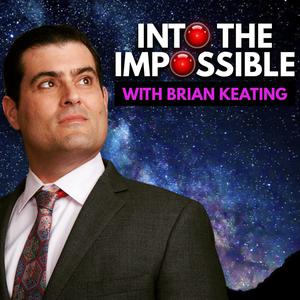 Into the Impossible With Brian Keating
Into the Impossible With Brian Keating
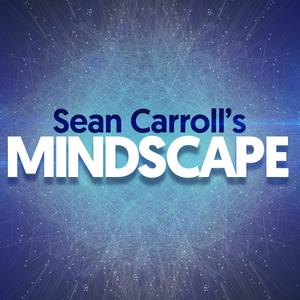 Sean Carroll's Mindscape: Science, Society, Philosophy, Culture, Arts, and Ideas
Sean Carroll's Mindscape: Science, Society, Philosophy, Culture, Arts, and Ideas
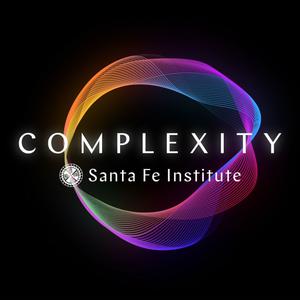 COMPLEXITY
COMPLEXITY
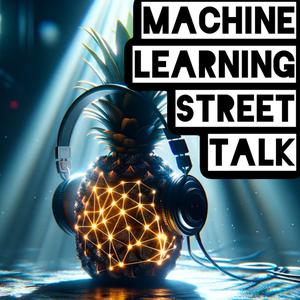 Machine Learning Street Talk (MLST)
Machine Learning Street Talk (MLST)
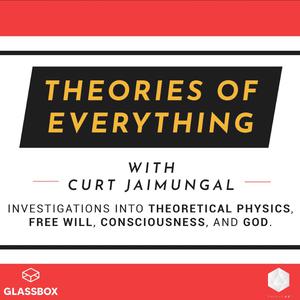 Theories of Everything with Curt Jaimungal
Theories of Everything with Curt Jaimungal